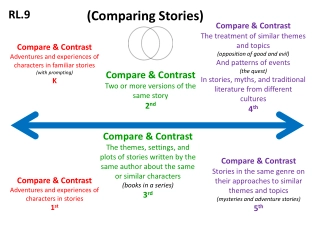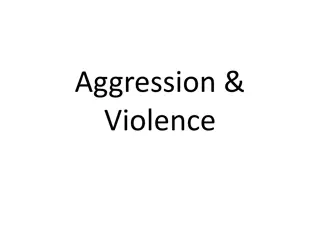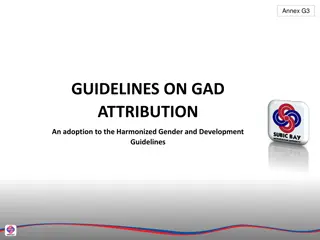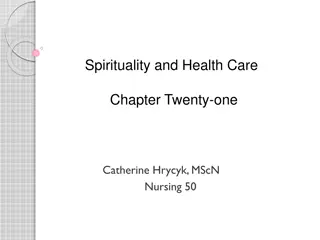Perspectives on Recreation and Physical Activities Across Cultures and Genders
Ideologies, beliefs, and world views shape how different cultures and genders approach recreation and physical activities. In Eastern cultures, martial arts and spiritual practices like yoga hold significance, while in Western cultures, sports are often viewed as a business opportunity. South African culture has evolved from apartheid-era segregation in sports to promoting inclusive participation post-democracy.
Download Presentation

Please find below an Image/Link to download the presentation.
The content on the website is provided AS IS for your information and personal use only. It may not be sold, licensed, or shared on other websites without obtaining consent from the author. Download presentation by click this link. If you encounter any issues during the download, it is possible that the publisher has removed the file from their server.
E N D
Presentation Transcript
IDEOLOGIES, BELIEFS AND WORLD VIEWS ON RECREATION AND PHYS ICAL ACTIVITIES ACROSS CULTURE S AND GENDERS
The ideologies, beliefs and world views that people have on recreation and physical acti vity differ across cultures and genders. The reasons why people participate, to wha t extent recreation and physical activity are encouraged, and the specific types of recre ational and physical activities that are emp hasised, vary a great deal.
EASTERN CULTURE In some eastern countries forms of martial art s and self defence are practised by many peop le because these activities are a part of their i deologies, belief systems and religion. Sumo wrestlers are seen as hero s in Japan. Yoga is seen as more of a spiritual activity than a physical activity in India.
https://encrypted-tbn2.gstatic.com/images?q=tbn:ANd9GcRrLFEQisAQnJaeLspo5aEvONTZFgp7ZLswg7rQV6hupCDLnW5dhttps://encrypted-tbn2.gstatic.com/images?q=tbn:ANd9GcRrLFEQisAQnJaeLspo5aEvONTZFgp7ZLswg7rQV6hupCDLnW5d https://encrypted-tbn1.gstatic.com/images?q=tbn:ANd9GcRZmw65E_0IoO2N9ynLFWNjQt5IP15dJNsZ6rnLT7kUElw6nylIOQ https://encrypted-tbn2.gstatic.com/images?q=tbn:ANd9GcRSF2-sZ2g5MYARhyRy0TY9BRHXe09AosAHXe7YLXy2mnbxDqKyyRd0qQ https://encrypted-tbn3.gstatic.com/images?q=tbn:ANd9GcR3NBRXHtP7RLYEAgWEaETQqIJ3Sl-ogIUNW_f_s-6MThWV5kpF8w
WESTERN CULTURE In the Western Culture sport is seen as a way t o make money. Lots of money is spent on sporting events acti vities, and sponsorship. Sporting is a huge industry, with many job opp ortunities. People world wide watch and participate in w estern sport such as golf, soccer, motor racing. Sport bring people together.
https://encrypted-tbn2.gstatic.com/images?q=tbn:ANd9GcR5VEeVA8wahYC-m6cxoSIWBpWVEAl_cC_JLSM3bnnjDYkYqy0shttps://encrypted-tbn2.gstatic.com/images?q=tbn:ANd9GcR5VEeVA8wahYC-m6cxoSIWBpWVEAl_cC_JLSM3bnnjDYkYqy0s
SOUTH AFRICAN CULTURE Under apartheid certain sports were designate d for a specific cultural group. Rugby was seen as for white males. Most white schools offered rugby and compul sory for boys. In African schools soccer was promoted. With democracy, there has been an improvem ent and now all people are allowed and encou raged to play the sports they would like to pla y.
TRADITIONAL CULTURES Culture plays an important part in the choice o f recreation. Eg. Stick fighting is popular in the Nguni cultur e. Men were encouraged to practice stick fightin g, a form of martial art, to prepare them to be come warriors. It is still practiced today and a very important part of indigenous culture.
INDIGENOUS GAMES In traditional cultures if you are good in sport i t boosts your social status. Sport is usually a social or recreational activity and is not seen as a way to make money. Sport also teaches young people the value of t heir culture, such as teamwork and self-discipl ine. Sport is a way of bringing people in the comm unity together.
WORLD VIEWS ON RECREATION A ND PHYSICAL ACTIVITY The Olympic Games are held every Four years. The best sport people from all over the world compete for a gold medal in a variety of sport. Differences in ideologies, beliefs and world vie ws become less important than the opportuni ty to compete on the world stage. Increasingly women are competing in the Oly mpics. More and more nations are sending their athl etes to the event.
Sportspeople get the opportunity to learn a bout other cultures as they spread a unified image of participation in sport. Events like the Olympics can help to encour age all nations to participate in and have eq ual access to physical activity.
VIEWS REGARDING GENDER Participation in sport and many recreational a ctivities is still dominated by men. People believe men are more competitive and more aggressive, and that these qualities are n ecessary to play sport or to be a winner. Men not interested in sport are often ridiculed . Women that are good at sport are seen as to manly.
In some cultures women are severely restri cted on what they can wear to play in sport . Therefore they are often marginalised. E.g. Iranian women were disqualified from participating in a soccer match because the ir dress code did not match the FIFA s rules.

















































